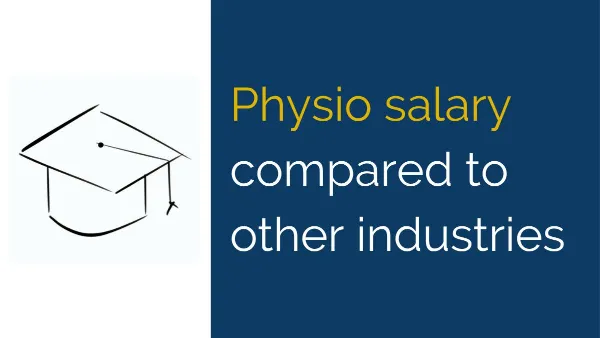We wondered, how would a Physiotherapy salary compare to other jobs? And we found some surprising results.
Physiotherapists’ income has long been a point of issue – it’s starts reasonably good and then doesn’t seem to progress at a comparable rate to your experience.
But how does that compare to other industries?
Given the high ATAR (ATAR is the ranking given to students graduating their final year of school in NSW) required to get in to Physio, how does that compare to other jobs around a similar ATAR?
Note that every state in Australia has their version of an ATAR (eg. “Selection Rank” in Victoria) but these aren’t directly correlated to an ATAR, so you can’t convert one to the other.
Before you jump ship from Physio…
This post isn’t suggesting we all run for greener pastures!
It’s a comparison of similar jobs out there so you can benchmark your Physio salary compared to other industries.
Obviously every industry has different job conditions and demands, so that needs to be taken into account.
For example, teachers may get less income but they have decent hours and annual leave (although it’s always in school holidays when travel prices are high and kids are everywhere).
If you’re seriously considering a swap away from Physiotherapy, do me a favour:
Have a quick read about asking for a pay rise at your current job, looking at other jobs within the Physio industry or adding a side hustle to boost your income and stay in Physio.
After all the hard work to get to where you are, it’d be unfortunate to see another Physio walking away…

Feel that your career could really take off if you found a better job?
Looking to expand your skills (and income) with a 2nd job? Or maybe some weekend work or sports coverage?
We offer a free service, anonymously matching awesome Physios with awesome jobs (your identity is always protected). The next great opportunity of your career might be searching for you right now.
Physiotherapy salary compared to jobs with similar entry criteria
This data has been collected from a major job website in Australia. It shows the income range of jobs advertised for each role.
It’s worth noting a couple of points: this sample is biased towards the lower (but larger) end of the market. Top level positions tend to be recruited via different means, so you won’t find the best earning jobs in any industry advertised on a job website (eg. Position Available: CEO of Tesla…)
The other point is that the exact job title changes the salary range considerably. Think about the salary range for a “Junior Physiotherapist” vs “Physiotherapist” vs “Senior Physiotherapist”.
As a reference point, the salary range listed for Physiotherapist is A$80-90k and the ATAR range is 75-99.2 (although it fluctuates every year).
Engineer
There’s a wide range of Engineering careers – civil, data and mechanical, just to name a few.
The earning potential of each of these streams is quite different but, as a guide, you’ll need an ATAR of 80 for Newcastle and Macquarie universities and 92 for University of Sydney.
- Engineer’s salaries range from A$60-130k
- Civil Engineer salaries range from A$80-130k
- Structural Engineer salaries range from $80-110k.
Finance/Business
The finance industry has a wide range of job streams, all with similar entrance qualifications. That means you could start in one area of finance and branch out into another as your interests change.
To get into a Finance degree, you’ll need an ATAR of 70-80+. Business degrees require an ATAR of 70-80+ as well.
- Financial Analysts earn A$90-110k
- Accountant’s can earn A$60-80k (although this would be considered an entry level salary)
- Business Analyst’s salaries are around A$100-130k.
Lawyer
Most legal degrees are packaged as double degrees, where you’ll do a law degree alongside a Business, Arts or similar degree. There are some straight Law degrees and the combined degree options differ between universities.
To get into a Law or combined Law degree, you’ll need an ATAR of 73-99.5.
From there, you can expect to earn around A$70-120k in your early years.
Pharmacist
In the healthcare field, there are careers as doctors, nurses and other Allied health roles. For the best comparison to Physio entrance marks, I’ve chosen Pharmacy due to its similar range of ATARs.
To get into a Pharmacy degree, you’ll need an ATAR of 72-90.
In your early years, a Pharmacist can expect to earn A$70-100k. Much like Physiotherapy, the income tends to top out fairly early and doesn’t progress too much further beyond around 8 years experience.
Teacher
It’s a little surprising but there’s quite a few Physios who leave the profession for a teaching career. Whether it’s the lifestyle, the engagement or the work conditions, it seems to be an appealing area for those moving away from Physio.
To get into a teaching degree, the ATAR required is quite broad. You’ll get in with 68 (USQ), 75-80 (Macquarie – combined degree) or 85 (USyd). Much like Law degrees, Education degrees are often combined with other degrees for a double degree.
Teachers can expect to earn A$70-95k in their early years. The income tends to top out early (like Physio) and only continues higher with increased responsibilities (eg. Deputy Principal role).

